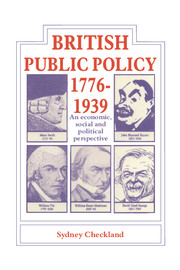Book contents
- Frontmatter
- Contents
- Preface
- Introduction
- Part I Industrialisation and war, 1776–1815
- Part II Assimilating the industrial revolution, 1815–51
- 4 The trend to economic laissez-faire
- 5 The social action equation and the zeitgeist
- Part III The Victorian apogee, 1851–74
- Part IV Industrial maturity and the ending of pre-eminence, 1874–1914
- Part V Total war and troubled peace, 1914–39
- Bibliography
- Index
5 - The social action equation and the zeitgeist
Published online by Cambridge University Press: 05 August 2012
- Frontmatter
- Contents
- Preface
- Introduction
- Part I Industrialisation and war, 1776–1815
- Part II Assimilating the industrial revolution, 1815–51
- 4 The trend to economic laissez-faire
- 5 The social action equation and the zeitgeist
- Part III The Victorian apogee, 1851–74
- Part IV Industrial maturity and the ending of pre-eminence, 1874–1914
- Part V Total war and troubled peace, 1914–39
- Bibliography
- Index
Summary
The social agenda
The industrial–urban society coming into being between 1815 and 1851 was confronted with four principal social areas in which it would be obliged to act. First there was the care of an increasing number of social casualties, to be provided by means of the poor law. Secondly there was an altogether new problem, namely the need for state surveillance of the conditions of work, chiefly in the factories and mines. Thirdly, because of the new concentration of people and industries in the cities, the state could not avoid an involvement in the conditions of living, chiefly through measures to promote public health. Finally, there was the question of education: what should government do about the needs of society and the rights of individuals in this respect? These were the four basic social functions into which the state was to be drawn between 1815 and 1851 in order to ease and contain the pressures of industrialisation and to fit the working population for their tasks. On the question of the supply of housing for the working classes, a matter in which the market was in a chronic default, the state did nothing.
There were five further elements of the national life, of a more implicit kind, upon which the state acted. Firstly, the family was the basic cell form of society; the state could not avoid a relationship with it through divorce law and the rights of married women to property.
- Type
- Chapter
- Information
- British and Public Policy 1776–1939An Economic, Social and Political Perspective, pp. 82 - 112Publisher: Cambridge University PressPrint publication year: 1983



